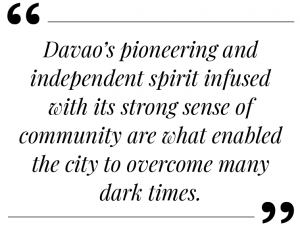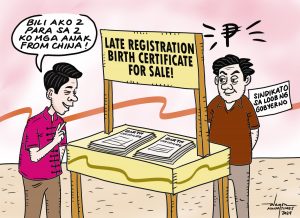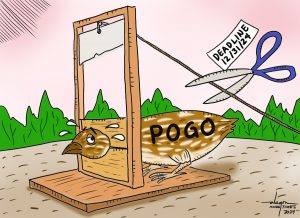 Is it just me or is Davao City becoming a more toxic place to live in nowadays?
Is it just me or is Davao City becoming a more toxic place to live in nowadays?
All the holiday gatherings I went to last year had one recurring theme in conversations — Davao is not the same city it used to be.
Remember when Davao was named “one of the top 20 most livable cities in Asia” by Asiaweek Magazine? Sure, that recognition was way back in the 1990s, about three decades ago. It was also around the same time Davao was named “Destination of the Year” by the Department of Tourism. It was quite a big deal when you think that only a decade before that, Davao was known as the “killing fields of Asia.”
Davao City was also consistently ranked as among the most competitive cities to do business in the Philippines with high local income revenues up there with Makati City and Quezon City. Our city was the only city outside of Metro Manila that’s considered most competitive. What made it more remarkable was Davao achieved it with little help from external sources or from the national government. It was mostly locally generated yet we had fewer local businesses then and even fewer people living here than in other Metro Manila cities.
In 2005, Davao City got its first, and so far only, Galing Pook Award for its gender-responsive governance. It got several national and international recognitions for its trailblazing gender and development programs. In fact, Davao created several landmark pieces of legislation way ahead than the national government that national legislators had to learn from Davao how to make laws that will promote women empowerment and gender equality.
Davao also belonged to the hall of fame of top performing cities for consistently leading in being child-friendly, being the cleanest and greenest, having the best nutrition program, having the lowest crime rates, and having the best police office in the nation. Not only that, Davao has the “best water in the world.”
Those were the days when the morale of Davaoeños was high.
So what happened to our city? Did we get tired and just stopped trying?
I do not have the statistics so I am making my assessment based on my experience as a resident of the city.
Traffic is worsening and has become unbearable. Maybe that is a fact of life for highly urbanized cities all over the world, but I believe we can do better if we deal with traffic as a system that is interconnected. We used to have a state-of-the-art adaptive traffic control system similar to what they have in Los Angeles, California. But it is not working now because we have not upgraded the system from 20 years ago. Why? How many new iPhones have come out since we had our traffic system installed? As far as I know, it is an open system that can work with upgrades and new software. Surely in the age of artificial intelligence, we can make it work better now?
Our solid waste management has more waste and less management. Only a few barangays have their own material recovery facility. Waste segregation is not being done and everything is dumped into the landfill that we now need a new one. And at least half of the waste dumped in our landfills are food waste and biodegradable. Yet we have a private world-class facility using Japanese technology that is capable of transforming biodegradable waste into organic fertilizer at Davao Thermo Biotech Corporation here in Davao City. We have the technology that other local government units in the country are clamoring to have but our own city government is not taking advantage of it.
The ease of doing business in Davao City has not been easy lately. I have heard too many local entrepreneurs complain and these are not all new businesses, but old ones who have experienced the days when building permits, occupational permits, and business permits did not take months to process. I don’t understand why this is happening. Did we add more steps to the process? Or are all those experiencing delays simply non-compliant? And if that is the case, why are they refusing to comply? It does not make sense.
I have heard too many stories of Davao-based businesses getting their business permits from other local government units just to keep their businesses going. I wonder how much the city is losing in terms of revenue because of this unfortunate situation.
Increasing reports of rape, sexual harassment, and other gender-based violence are also concerning. Teen pregnancy is also on the rise. For a city known for its progressive women’s movement and innovative gender-responsive programs, we need to take this matter more seriously.
Yes, the world in general is in chaos. But it has always been the case throughout history. We deal with it and we work on making things better. That’s what we do.
Yes, WE. That is the operative word. It’s a collective endeavor.
That is why we cannot leave it to the government alone to solve our current problems. We must come up with innovative solutions ourselves just like in the past.
I believe our longest-serving city mayor will be the first to agree that Davao City’s success does not depend on its leadership. It helps, but that’s not all there is. The secret of Davao’s success is not Duterte. In fact, it was the Davaoeños who helped Duterte succeed.
Davao’s pioneering and independent spirit infused with its strong sense of community are what enabled the city to overcome many dark times.
Our city has given birth to many strong people’s movements — workers, women, youth, interfaith, local entrepreneurs, cooperatives, artists, cultural workers, children’s advocates, environmentalists, and many more. From these movements we were able to craft many landmark pieces of legislation and trailblazing programs.
Before Rodrigo, there was his mother, Soledad. Nanay Soling, an activist and a pillar in the women’s movement, knew that people’s active participation and collective action are needed to make things happen. So she convened all people’s organizations, non-government organizations, and socio-civic groups in the city regularly during the 1970s and 1980s to coordinate all community development work to maximize impact and use of resources and minimize duplication. She had no formal position in government, just a concerned citizen.
I believe what’s missing now is the active participation of civil society and people’s movements in local governance.
There are many Davaoeños from different sectors our local government can ask for help, pro bono. In fact, the Datu Bago Awardees Organization alone has a wealth of individual and collective knowledge and experience that can be harnessed to create innovative solutions to our city’s problems.
The Local Government Code has provided for mechanisms to allow people to participate in local governance. Let us not wait for our local government to ask us for help. Let us go ahead and do it ourselves. We must reclaim the Davao we deserve.


